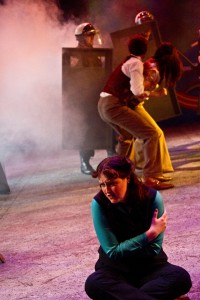
The Marshall Theatre invited a welcoming audience May 5, for the opening night of the play “Execution of Justice.”
Junior Cody Levien said he doesn’t go to plays — ever. He attended the first “Execution of Justice” performance and summed it up in one word: “emotional.”
Levien’s uncle was a part of the gay community in San Francisco during the late ’70s when the city’s mayor, George Moscone and city supervisor, Harvey Milk were slain. Milk was the first openly gay man elected to public office in California during the 1970s
“He was there for the whole thing,” Levien said. “If anything, [seeing the play] was more of a learning experience.”
The aftermath of the assassinations drove the focus of the play.
Written by Emily Mann, the play documents the
trial proceedings of the man responsible for the 1978 double murders, Dan White.
“There were two murders that were committed and it was clearly proven, and yet they only gave him manslaughter,” Jane Lieber Mays, who watched the play with her husband, said. “That hit home because it’s indicative of what continues to happen in this country. People just make stuff up, and they are swayed by this emotional stuff that people make up and they vote according to that.”
Lieber Mays said she knows about Milk because she’s from that generation.
“I was in the ’60s when we were actually rioting,” she said. “I’ve been in it before.”
Lieber Mays praised the way the theater’s new equipment allowed the program to integrate varying forms of multimedia into the production.
“What they were able to do with [the equipment] was astonishing — we went through without a glitch tonight,” she said. “It was seamless; it was just beautiful.
The stage featured powerful projectors that the Department of Theatre and Communication Arts purchased using a grant from the E.L. Wiegand Foundation, a nonprofit organization that serves charitable and educational purposes.
Lieber Mays said despite understanding the levels of interpretation
attempted, some of the play’s symbolism was distracting. However, she was blown away by the acting.
“The level of acting was amazing,” she said. “The level of acting is always high-quality, but they were up a notch this time. It has to do with the director and the commitment of the actors and probably the subject matter.”
“Shedding light on a part of history was the main objective for the play’s production,” Janet Gupton, associate professor of theatre arts anddirector of “Execution of Justice,” said.
“I felt like after the movie Milk came out, it was a good time to do this play because it picks up where Milk left off,” she said. “It’s a good chance for people to know what happened to Dan White and what happened in the trial.”
Levien and Lieber Mays said the summation scenes toward the end of the play stood out to them.
The audience was moved during the confession scene of Dan White, played by junior Aaron Granum and junior Daphne Dosset, who played the court clerk and the young mother roles in the play, she said.
“You could see people turning their programs into fans to dry their wet faces,” she said.
The gravity of the play was compelling, leaving audience members in the middle of understanding and grief.
“It’s a lot of stuff to ask of them, but I think [the cast and crew] learned a lot by doing this show. [We] learned a lot of history and about the human psychology but also the human spirit,” Gupton said.
Gupton said that she has a high respect for public servants, those who are “willing to lay their life on the line knowing that they could
really make someone angry.”
“To discover these injustices in a world where we’re more accepting of everything, and realize that this happened in your own country, has to be a deeply moving experience,” Lieber Mays said.
The final show of “Execution of Justice” will run at 7:30 p.m. on May 14 inside the Marshall Theatre of Ford Hall.
___________________________________________________________________________
Septembre Russell/Copy chief
Septembre Russell can be reached at [email protected].






